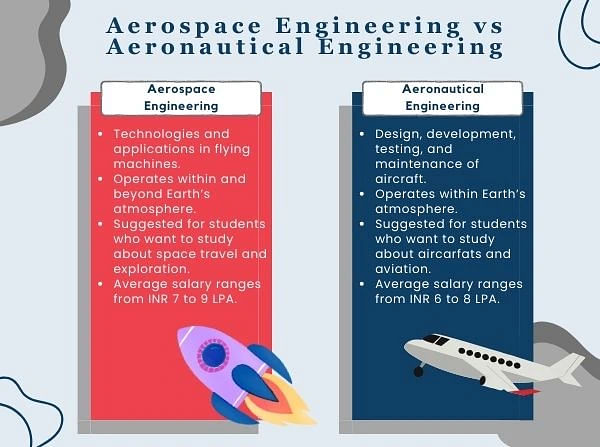Aeronautical Engineering is the study of aircraft functioning within the earth's atmosphere while Aerospace Engineering is the study of aircraft operating within & out of the earth's atmosphere, is the primary distinction between aeronautical engineering and aerospace engineering.
Table of Contents
Aeronautical engineering mainly focuses on designing, creating, and testing aircraft, such as airplanes, helicopters, and other flying machines that function within the atmosphere of the Earth. Contrarily, Aerospace engineering is a more comprehensive area that covers the design and construction of spacecraft, satellites, and other systems that function outside of the Earth's atmosphere.
What is Aeronautical Engineering?
Aeronautical Engineering primarily focuses on gaining knowledge about the design, manufacture, and maintenance of airplanes. The research, design, and production of aircraft, spacecraft, satellites, and missiles will be taught to the students. Aerodynamics, flight mechanics, stability, and control are all topics covered in aeronautical engineering classes.
- Future engineers can use the skills they learn in this course to design, construct, and test both military and commercial aircraft, spacecraft, and missiles.
- Aeronautical engineers produce prototypes, propulsion systems, and building materials for airplanes by fusing the sciences of physics and aerodynamics with their expertise in electromechanical and technological design.
- Furthermore, they use mathematical models, engineering concepts, and testing to make sure the systems they design and construct work as they should.
Skills Required:
- Exceptional academic record in the science field
- Aptitude in mathematics, logic, and analysis
- Ability to focus intensely for a lengthy period.
- Scientific knowledge
- Observation of details
Also Check: BE Aeronautical Engineering
What is Aerospace Engineering?
Aerospace engineering is an important discipline of engineering, and the topics focus on the development, testing, production, and design of spacecraft, aircraft, and other related systems and equipment.
- The field focuses mostly on space and atmospheric flight. Aeronautical engineering and astronautical engineering make up the two sections.
- For the purpose of designing aircraft, spacecraft, satellites, and missiles, aerospace engineering students study.
- Engineers create the instruments, control panels, landing gear, wings, engines, and airframes of airplanes.
Skills Required:
- Precision, quickness, and analytical capacity
- Ability to pay attention to details and concentrate
- Readiness to assume responsibility
- Alertness and mental clarity
Also Check: M.Tech Aerospace Engineering
Difference Between Aeronautical and Aerospace Engineering

In comparison to aeronautical engineering, the term "aerospace engineering" is more expansive and comprises aerospace engineering. The basic differences between both are listed below:
| Parameters | Aeronautical Engineering | Aerospace Engineering |
| Prime Focus | Design, development, testing, and maintenance of aircraft | Technologies and applications in flying machines |
| Operating Environment | Within Earth's atmosphere | Within and beyond Earth's atmosphere |
| Crucial Elements |
Aerodynamics Propulsion Systems Flight Mechanics |
Aeronautics Rocket Science Satellite Technology |
| Job Profile |
Flight Mechanics Engineer Graduate Engineer Trainee Assistant aircraft engineer |
Robotics Engineer Aviation Manager Design Engineer |
| Average Salary | INR 6 to 8 LPA | INR 7 to 9 LPA |
| Top Recruiters |
Hindustan Aeronautics Limited National Aerospace Laboratories DRDO |
DRDO HAL JP Morgan Accenture |
Also Check: What is Engineering? Definition, and Types
Which is Better: Aerospace or Aeronautical Engineering?
Depending on the student's individual interests and professional objectives, students might choose between aeronautical engineering and aerospace engineering. Although the two disciplines are closely related and have many things in common, there are some parameters that one should consider while choosing:
- Prime Objective: The aerodynamics, propulsion systems, materials, and aircraft-specific constructions are the focus of the work of aeronautical engineers. Contrarily, aeronautical engineering focuses on rockets, space exploration vehicles, and other vehicles, and technology is just some of the things that aerospace engineers work on.
- Interest: Aeronautical engineering can be a better option if you are primarily interested in airplanes and aviation. Aerospace engineering might be a better fit if you have a broader interest in both space travel and space exploration.
- Career Opportunities: Due to its wider breadth, aerospace engineering may offer more varied career options. The highly specialized nature of aeronautical engineering may restrict your alternatives in some circumstances.
- Educational Programs: Research the particular courses that universities offer. Some academic institutions allow you to concentrate on aerospace engineering or provide combination programs.Given that it only concerns itself with one aspect of aerospace, aeronautical engineering is frequently seen as a specialist subfield of the discipline. Another subfield of aeronautical engineering, astronautical engineering, is completely concerned with spacecraft.
- Objective: Aeronautical engineers concentrate on atmospheric flight, whereas aerospace engineers concentrate on both space and atmospheric flight. Space is the main distinction between aeronautical and aerospace engineers.
- Study focus: The study of thermodynamics, heat transmission, aircraft construction, mechanical control, and stability are frequent topics studied in aeronautical engineering courses.
Jet propulsion, spacecraft design, and orbital mechanics are some of the topics that are covered in greater detail in aerospace engineering courses as they examine the impacts of flying aircraft outside of the atmosphere.
Also Check: 10+ Highest Paying Engineering Jobs
Top Colleges Offering Aeronautical and Aerospace Engineering
Top Colleges offering Aeronautical and aerospace engineering courses are listed below with their average fees:
| Top Colleges | Average Tuition Fees |
| IIT Madras | INR 8.19 lakhs |
| Manipal Institute of Technology | INR 14.5 lakhs |
| Punjab Engineering College (PEC) Chandigarh | INR 4.7 lakhs |
| IIT Kanpur | INR 8.5 lakhs |
| Sathyabama Institute of Science and Technology | INR 5 lakhs |
| Acharya Institute of Technology | INR 6.5 lakhs |
Also Check: Top Engineering Colleges in India 2023























POST YOUR COMMENT